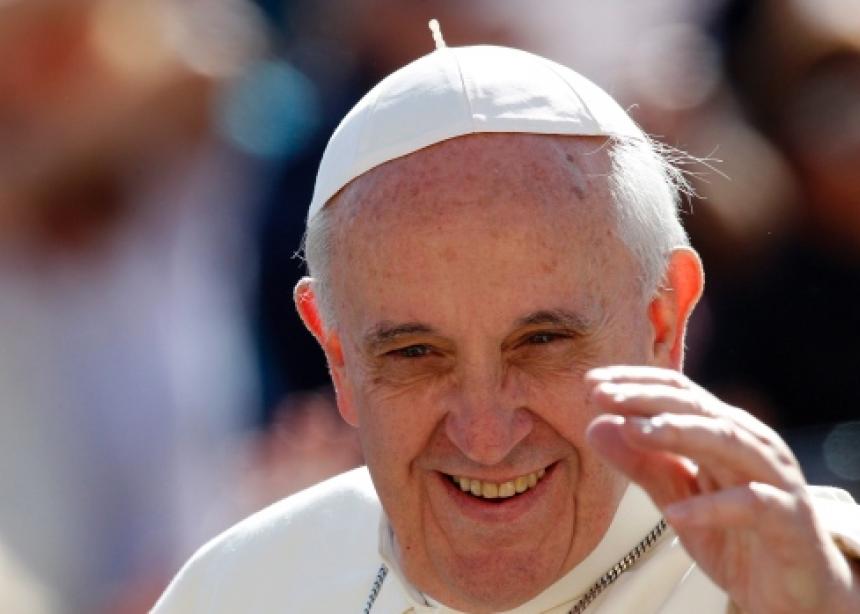In a lengthy, wide-ranging interview with journalists from his own Jesuit order, Pope Francis makes a number of stunningly frank comments that are likely to rattle the church and to cement his reputation as a leader more concerned with a pastoral approach than a doctrinal hard line.
Among other things, Francis said that while he has been reprimanded for not speaking much about abortion, contraception and homosexuality, he does not think it necessary to “talk about these issues all the time” and warned that the church can become “obsessed” with a few doctrines.
He also speaks about the need to treat gays and lesbians with respect and without condemnation, and he cautions against a “restorationist” mentality in the church and adds: “I have never been a right-winger.”
Here are some other highlights from the 12,000-word interview, which was conducted at the Vatican over three sessions in August. It was published simultaneously on Thursday (Sept. 19) by 16 Jesuit publications around the world:
On ministering to gays and lesbians:
“A person once asked me, in a provocative manner, if I approved of homosexuality. I replied with another question: ‘Tell me: when God looks at a gay person, does he endorse the existence of this person, or reject and condemn this person? We must always consider the person.”
On the church’s priorities:
“We cannot insist only on issues related to abortion, gay marriage and the use of contraceptive methods. This is not possible. I have not spoken much about these things, and I was reprimanded for that … The teaching of the church, for that matter, is clear and I am a son of the church, but it is not necessary to talk about these issues all the time.”
“Women are asking deep questions that must be addressed. The church cannot be herself without the woman and her role.”
“We have to work harder to develop a profound theology of the woman. Only by making this step will it be possible to better reflect on their function within the church. The feminine genius is needed wherever we make important decisions.”
“We have to find a new balance; otherwise even the moral edifice of the church is likely to fall like a house of cards, losing the freshness and fragrance of the Gospel. The proposal of the Gospel must be more simple, profound, radiant.”
On Pope Francis:
“My authoritarian and quick manner of making decisions led me to have serious problems and to be accused of being ultraconservative … but I have never been a right-winger.”
“I am a sinner. This is the most accurate definition. It is not a figure of speech, a literary genre. I am a sinner.”
On his pastoral approach:
“I see clearly that the thing the church needs most today is the ability to heal wounds and to warm the hearts of the faithful; it needs nearness, proximity. I see the church as a field hospital after battle. It is useless to ask a seriously injured person if he has high cholesterol and about the level of his blood sugars! You have to heal his wounds. Then we can talk about everything else. Heal the wounds, heal the wounds …”
“The great leaders of the people of God, like Moses, have always left room for doubt. You must leave room for the Lord, not for our certainties; we must be humble. Uncertainty is in every true discernment that is open to finding confirmation in spiritual consolation.”
On how Catholics should relate to their church:
“The church sometimes has locked itself up in small things, in small-minded rules. The most important thing is the first proclamation: Jesus Christ has saved you. And the ministers of the church must be ministers of mercy above all.”
“We should not even think, therefore, that ‘thinking with the church’ means only thinking with the hierarchy of the church.”
“The confessional is not a torture chamber, but the place in which the Lord’s mercy motivates us to do better. I also consider the situation of a woman with a failed marriage in her past and who also had an abortion. Then this woman remarries, and she is now happy and has five children. That abortion in her past weighs heavily on her conscience and she sincerely regrets it. She would like to move forward in her Christian life. What is the confessor to do?”
“The people of God want pastors, not clergy acting like bureaucrats or government officials. The bishops, particularly, must be able to support the movements of God among their people with patience, so that no one is left behind.”
--Sept. 19, 2013



Add new comment
Canadian Mennonite invites comments and encourages constructive discussion about our content. Actual full names (first and last) are required. Comments are moderated and may be edited. They will not appear online until approved and will be posted during business hours. Some comments may be reproduced in print.